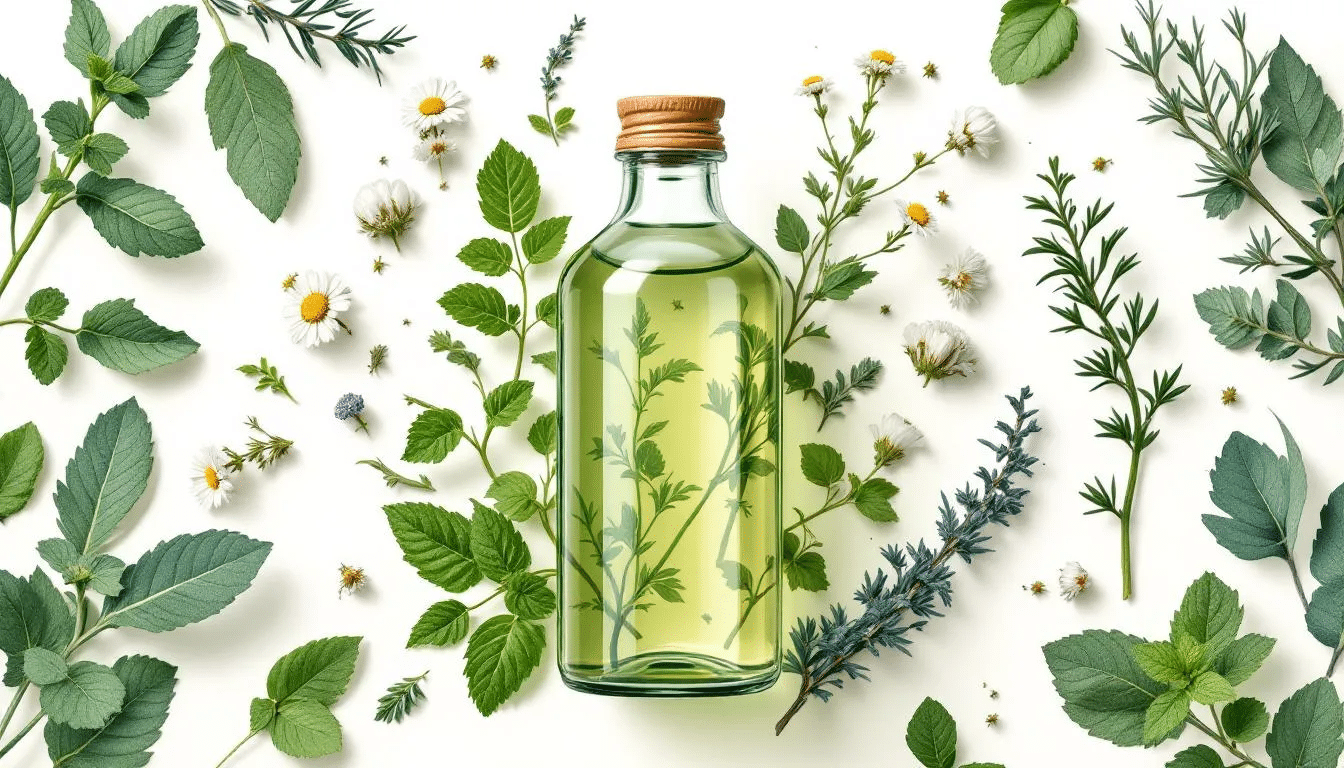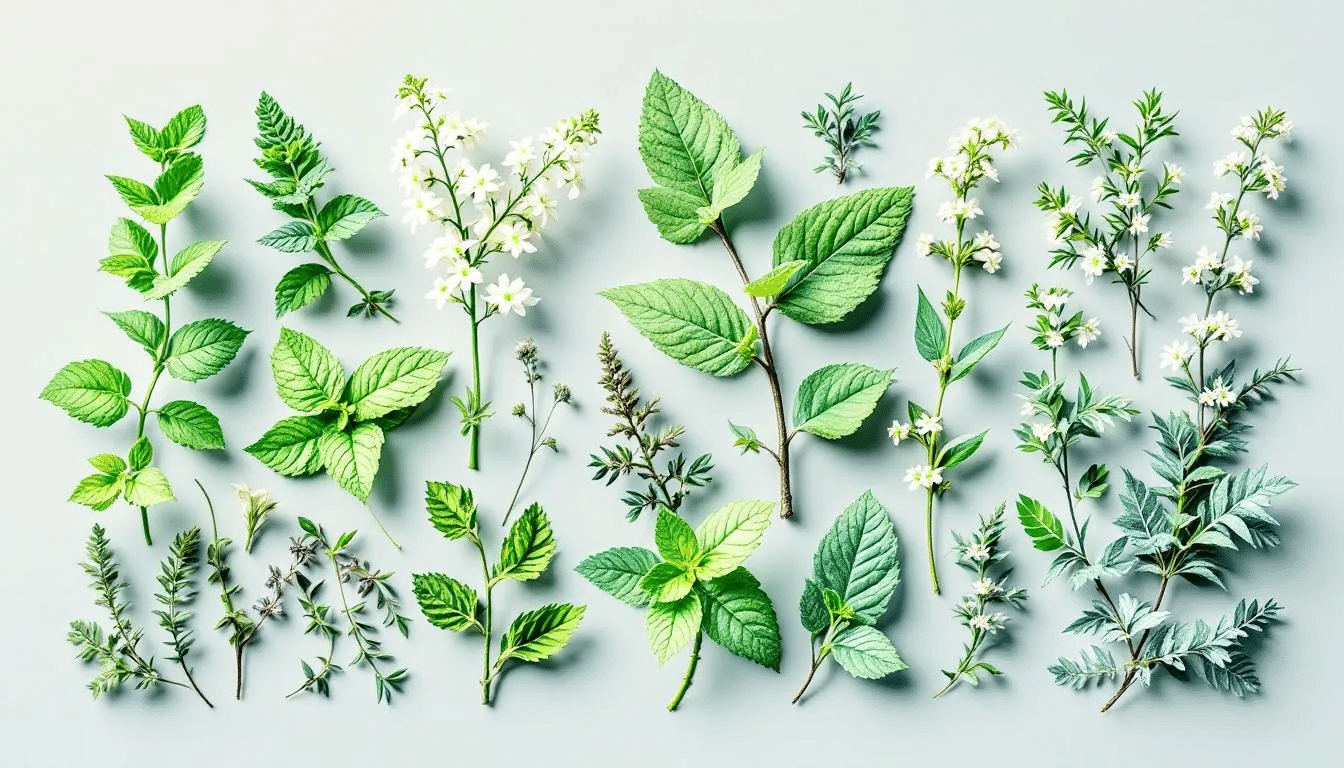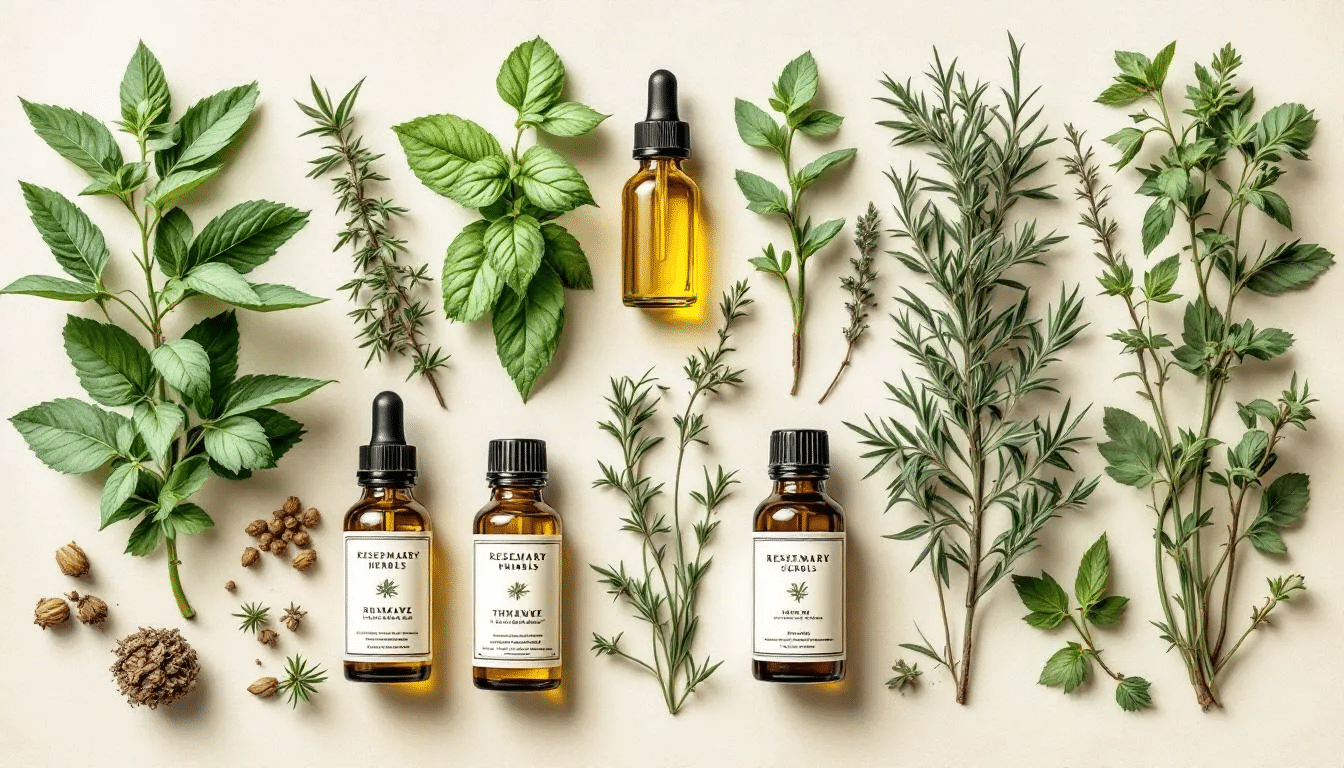
Top 5 Herbs for Mouthwash: Natural Solutions for Fresh Breath and Oral Health
Curious about how herbs can improve your mouthwash? This article reveals the best herbs for mouthwash, their benefits, and how to use them for fresher breath and better oral health.
Key Takeaways
- Homemade mouthwash incorporating medicinal herbs like peppermint, tea tree, and echinacea can enhance oral health by combating bacteria, reducing inflammation, and improving breath freshness.
- Choosing between essential oils and fresh herbs for mouthwash depends on personal preference; essential oils offer concentrated antimicrobial benefits, while fresh herbs provide nutritional value and milder flavors.
- To ensure the effectiveness and safety of homemade mouthwash, it is crucial to select high-quality, organic ingredients and to balance its use with regular professional dental care. Natural mouthwash alternatives typically do not contain certain alcohols and fluoride, which are toxic if swallowed in large amounts. Many homemade mouthwash recipes include salt, baking soda, and essential oils for their antibacterial and antimicrobial effects.
Top Herbs for Homemade Mouthwash

Homemade mouthwash can be a game-changer in your oral hygiene routine, especially when it includes a variety of medicinal herbs known for their dental benefits. Using natural herbs in your mouthwash not only helps in combating dental decay but also ensures fresh breath and enhanced oral health. Natural mouthwashes are often preferred by those avoiding harsh chemicals found in commercial products, which may contain alcohol and artificial ingredients that can cause irritation.
These herbs can significantly improve your daily oral care routine. Here are the top herbs that can transform your homemade mouthwash into an oral care powerhouse. For example, herbal ingredients like sage have anti-inflammatory properties that help treat various oral diseases, making them a valuable addition to your mouthwash.
Peppermint
Peppermint is a superstar when it comes to homemade mouthwash because:
- It eliminates harmful bacteria
- It provides a cooling sensation
- It has a refreshing flavor that helps combat bad breath
- It soothes the gums Peppermint oil is a staple in oral hygiene.
Incorporating peppermint essential oil into your mouthwash provides both fresh breath and enhanced oral health. Whether used alone or with other essential oils, peppermint adds a refreshing and effective touch to your mouth rinse.
Tea Tree
Tea tree oil is renowned for its strong antibacterial properties, making it an excellent addition to your mouthwash. Tea tree oil combats bacteria linked to gum disease, promoting healthier gums and reducing inflammation.
Its anti-inflammatory benefits further enhance its role in oral care, making it a natural choice for those looking to improve their oral hygiene with herbal products. Incorporating tea tree oil into your mouthwash can provide a powerful boost to your oral health regimen.
Echinacea Angustifolia
Echinacea angustifolia is more than just an immune-stimulating herb; it’s a valuable addition to your oral care routine. Known for preventing and treating gingivitis and periodontal disease, Echinacea can help maintain a healthy mouth while boosting your immune system. By preventing infections and promoting overall oral health, this herb offers a natural solution to keep your mouth in prime condition.
Echinacea angustifolia in your mouthwash offers a holistic approach to oral care.
Oregon Grape Root
Oregon grape root is a powerhouse of antimicrobial and anti-inflammatory properties, making it an excellent choice for homemade mouthwash. Its benefits include:
- Reducing plaque and gingivitis, supporting healthier gums and teeth
- Strong antimicrobial effects that prevent dental issues
- Ensuring better oral hygiene
Adding Oregon grape root to your mouthwash can significantly enhance its effectiveness in promoting good oral health and hygiene.
White Oak Bark
White oak bark is celebrated for its soothing and astringent properties, making it a valuable herb for oral health. Its astringent qualities help tighten tissues and reduce inflammation, providing relief from mouth sores and inflamed gums. A rinse made from white oak bark can alleviate oral discomfort and promote healing, making it an excellent addition to your oral care routine.
White oak bark in your mouthwash enhances overall mouth comfort and health.
Essential Oils vs. Fresh Herbs

When it comes to creating an effective mouthwash, the choice between essential oils and fresh herbs can be significant. Essential oils are known for their therapeutic properties, offering concentrated and potent effects in small quantities. They tend to provide stronger antimicrobial benefits, making them a powerful option for oral health.
On the other hand, fresh herbs bring additional nutrients and milder flavors, appealing to those seeking natural and holistic options. Both have their unique advantages, and the choice often comes down to personal preference and specific oral care needs.
Benefits of Essential Oils
Essential oils are a potent addition to any mouthwash. Peppermint oil, for instance, is widely used for:
- Its refreshing taste
- Its ability to combat bad breath by eliminating odor-causing bacteria
- Its antibacterial properties that make it effective in managing oral health.
Tea tree oil, known for its potent antibacterial action, is beneficial for reducing oral bacteria and preventing gum issues. Thyme oil adds flavor and health benefits, making it a popular choice in mouthwash formulations.
Benefits of Fresh Herbs
Fresh herbs offer unique benefits when used in mouthwash. They provide additional nutrients and mild flavors, making them a preferred choice for many. Fresh herbs enhance the mouthwash with their unique flavors and nutritional benefits, adding a personal touch to your oral care routine.
Sourcing high-quality, pesticide-free herbs from local farmers’ markets or organic stores ensures safety and quality, making your homemade mouthwash both effective and delightful.
Press On Herbals Oral Restore Mouth Rinse

Press On Herbals Oral Restore Mouth Rinse is a standout product in the world of natural oral care. Made from a blend of:
- Bayberry Root Bark
- Cayenne Pepper
- Clove Bud Essential Oil
- Echinacea Angustifolia Root
- Myrrh Resin
- Peppermint Essential Oil
- Spilanthes Herb
- Tea Tree Essential Oil
- White Oak Bark this mouth rinse offers a comprehensive approach to oral health.
It combines the benefits of these powerful natural ingredients to fight harmful oral bacteria, reduce plaque, and maintain overall oral hygiene. Incorporating this mouth rinse into your daily routine can significantly enhance your oral health and provide a natural alternative to commercial mouthwashes.
DIY Mouthwash Recipes Using Herbs

Creating your own mouthwash at home is a simple and rewarding process. Using natural herbs and essential oils, you can craft effective mouth rinses tailored to your specific needs. For instance, the combination of cinnamon and clove creates a natural mouthwash with antibacterial effects. These DIY recipes not only promote oral health but also offer a natural alternative to commercial mouthwashes.
Let’s explore some easy-to-make mouthwash recipes that you can try at home.
Peppermint and Tea Tree Mouthwash
A straightforward and refreshing mouthwash can be made by combining peppermint and tea tree essential oils with water. Simply mix 1 cup of water with 4 drops each of peppermint and tea tree essential oils. For an enhanced effect, you can also add a teaspoon of baking soda to the mixture, which helps neutralize acids and reduce plaque buildup. Alternatively, a mixture for a peppermint and tea tree mouthwash can include a cup of distilled water, drops of tea tree oil, peppermint leaves, and baking soda for a more herbal approach. Xylitol can also be added to mouthwash for its antibacterial properties, further enhancing its effectiveness. A baking soda mouth rinse requires mixing a teaspoon of baking soda with a glass of distilled water.
This combination provides a cooling effect and helps combat bacteria that cause cavities and bad breath. Swish the mixture of sodium bicarbonate in your mouth for up to a minute to enjoy the full benefits of this natural baking soda rinse.
Echinacea and Oregon Grape Root Mouthwash
For a mouthwash that supports your immune system and fights harmful bacteria, combine Echinacea and Oregon grape root. This powerful duo helps maintain good oral health by boosting immunity and combating oral bacteria. Additionally, incorporating salt into the rinse can enhance its antibacterial properties and reduce gum inflammation. A saltwater rinse is often recommended for sore gums or after dental procedures, making it a versatile addition to your oral care routine. Parsley and mint can also be blended to create a mouthwash that helps freshen breath naturally. Hydrogen peroxide is a natural antiseptic that can kill germs and whiten teeth, making it another effective ingredient for mouth rinses.
To prepare, brew the herbs into a tea, let it cool, and use it as a mouth rinse. This natural mouthwash can effectively reduce plaque and reduce gingivitis while supporting overall oral hygiene.
White Oak Bark Rinse
A soothing rinse made from white oak bark can help reduce inflammation and treat mouth sores and mouth ulcers. Boil 2 cups of water with white oak bark for a few minutes, then steep and strain before use. Natural mouth rinses like this are safe for individuals with dry mouth, diabetics, and children ages two to twelve. Some natural mouthwashes can also be used safely by pregnant women, making them a versatile option for various groups. However, certain ingredients in natural mouthwashes, like hydrogen peroxide or apple cider vinegar and lemon juice, can cause irritation if used improperly. Baking soda can also assist in teeth whitening and removing stains, making it a valuable addition to your oral care routine. Clove oil freshens breath and has an astringent flavor, making it another excellent addition to homemade mouthwash.
This rinse’s astringent properties help tighten gum tissues and alleviate oral irritation, making it a valuable addition to your oral care routine.
Storing and Using Homemade Herbal Mouthwash
Proper storage and usage of homemade herbal mouthwash are crucial to ensure its effectiveness and longevity. Consider the following tips: Natural mouth rinses are safe for daily use and provide a less abrasive alternative to conventional rinses, making them suitable for regular oral care routines.
- Store your mouthwash in dark glass containers to protect essential oils from degradation.
- Keep it in a cool, dark place to preserve its ingredients.
- Discard homemade mouthwash after a month if it is not refrigerated to prevent spoilage.
Let’s delve into specific tips for storing and using your homemade mouthwash.
Proper Storage
To maintain the potency and effectiveness of your homemade mouthwash:
- Store it in a cool, dark place.
- Use airtight containers to minimize exposure to air.
- Use a dark glass jar to protect essential oils from light degradation, ensuring your mouthwash remains effective.
Proper storage is essential to keep your herbal mouthwash fresh and potent.
Usage Tips
Before using your homemade mouthwash, shake it well to ensure all ingredients are mixed thoroughly. Swish the mouthwash in your mouth for up to a minute, focusing on reaching all areas, including between your teeth.
Rinsing with water afterward can help eliminate any residual flavors, leaving your mouth feeling fresh and clean.
Balancing Homemade Mouthwash with Professional Care
While homemade mouthwash can significantly enhance your oral care routine, it’s essential to balance its use with professional dental care. Homemade mouthwash alone may not prevent cavities or other dental issues, highlighting the need for regular dental checkups and professional treatments. Additionally, homemade mouthwash lacks fluoride, which is commonly found in commercial mouthwashes and is important for cavity protection. Despite the effectiveness of some homemade mouthwash ingredients, limited scientific research exists on the overall effectiveness of DIY mouthwash compared to commercial products, which often undergo rigorous testing for their efficacy.
Herbal antimicrobial rinses can help reduce plaque accumulation and support overall oral hygiene, but they should complement, not replace, professional care. Let’s explore the importance of regular dental visits and professional advice.
Regular Dental Checkups
Routine dental visits are crucial for monitoring your dental health and preventing issues like tooth decay and gum disease. These checkups help detect early signs of problems that might not be visible otherwise and ensure personalized recommendations tailored to your oral health needs.
Consulting a dentist before integrating homemade or natural oral care products into your routine is essential for safety and effectiveness.
Professional Advice
Consulting a dentist before starting a new oral care routine, especially with natural products, is crucial. They can advise on the safety and effectiveness of these products to ensure optimal oral health.
Regular dental checkups are essential for early detection of issues like tooth decay, dental caries, and gum disease, helping maintain good oral health through preventive care.
Choosing Quality Ingredients
Selecting high-quality ingredients for your homemade mouthwash is vital to ensure its effectiveness and safety. Natural herbal mouth rinses are often perceived as safer alternatives to conventional mouthwashes, free from harmful chemicals. Using fresh, organic ingredients enhances the flavor and effectiveness of your mouthwash.
Here’s how to source herbs and select essential oils for a potent and safe mouthwash.
Sourcing Herbs
Fresh herbs provide a natural alternative with additional nutrients and mild flavors, making them an excellent choice for homemade mouthwash. Sourcing herbs from your own garden or local markets ensures that you are getting organic and pesticide-free options.
Look for herbs that are vibrant in color, have no signs of wilting, and smell fresh, as these indicators help determine the best quality ingredients for your mouthwash. High-quality herbs enhance the effectiveness and enjoyment of your herbal mouthwash.
Selecting Essential Oils
Selecting the right essential oils is an essential part of making an effective mouthwash. Check the labels for both the Latin names and common names of plants to ensure purity. Essential oils should be stored in dark glass bottles to protect them from light degradation, preserving their potency.
Additionally, ensure that the essential oils are free from synthetic additives and ideally certified organic. By following these steps, you can select high-quality essential oils that will make your mouthwash both safe and effective.
Summary
In summary, incorporating natural herbs and essential oils into your oral care routine can provide numerous benefits, from enhancing oral hygiene to promoting fresh breath. By choosing quality ingredients and following proper storage and usage tips, you can create effective and delightful homemade mouthwashes that offer a natural alternative to commercial products. Remember to balance your use of DIY mouthwash with professional dental care to ensure comprehensive oral health. Embrace the power of nature in your oral care routine and enjoy the refreshing and health-boosting benefits it brings.
Frequently Asked Questions
Can I use fresh herbs instead of essential oils in my homemade mouthwash?
Yes, fresh herbs can be used as a natural alternative to essential oils in homemade mouthwash, offering additional nutrients and milder flavors.
How should I store my homemade mouthwash to keep it fresh?
To keep your homemade mouthwash fresh, store it in an airtight dark glass container in a cool, dark place. This will protect the essential oils from degradation.
How often should I use homemade mouthwash?
Homemade mouthwash should be used daily as part of your oral care routine, swishing it in your mouth for up to a minute to ensure comprehensive coverage.
Is it necessary to consult a dentist before using homemade mouthwash?
It is essential to consult a dentist before using homemade mouthwash to ensure its safety and effectiveness, particularly when natural ingredients are involved. This precaution helps to avoid any potential adverse effects on your oral health. Consultation with a dentist is especially advised before using any type of natural mouthwash to ensure it aligns with your specific oral care needs.
What are the benefits of using essential oils in mouthwash?
Using essential oils in mouthwash offers strong antimicrobial properties that can effectively reduce bad breath and oral bacteria, while also providing refreshing flavors. This enhances overall oral hygiene and contributes to a healthier mouth.
Masterful Display
Each and everyone of our products are deeply considered, labored over, and improved upon time and time again. We invite you to experience the difference of our carefully crafted small batches of herbal support items. Whether it be our tea line, produced for a delightful experience, or our tincture blends and extracts, we have what you need.

